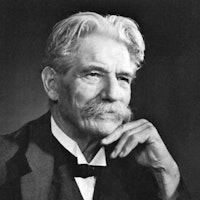Faith which refuses to face indisputable facts is but little faith. Truth is always gain…
Albert Schweitzer

The Straight Way of Faith
Topic: Belief & Faith
Faith which refuses to face indisputable facts is but little faith. Truth is always gain, however hard it is to accommodate ourselves to it. To linger in any kind of untruth proves to be a departure from the straight way of faith.
Albert Schweitzer (January 14, 1875 - September 4, 1965) was a multi-faceted personality—a theologian, organist, writer, humanitarian, philosopher, and physician—whose accomplishments spanned diverse areas. Born into an Alsatian family with a rich tradition in religion, music, and education, his early life was shaped by the spiritual and scholarly pursuits of his ancestors. This milieu nurtured his deep interest in theology and music. A Lutheran by faith, Schweitzer challenged both the secular view of Jesus as well as the traditional Christian view, contributing significantly to the interpretation of Pauline Christianity. His life was also characterized by a strong dedication to humanitarian work, as exemplified by his role as a medical missionary in Africa.
Schweitzer embarked on his intellectual journey at the University of Strasbourg in 1893, where he undertook intensive theological studies. He received his doctorate in philosophy in 1899 with a dissertation on Kant's religious philosophy and his licentiate in theology in 1900. During this period, he began preaching at St. Nicholas Church and held several high-ranking administrative positions at the Theological College of St. Thomas from 1901 to 1912. His acclaimed book, The Quest of the Historical Jesus, published in 1906, established his reputation as a notable theological scholar.
Parallel to his theological endeavors, Schweitzer pursued a distinguished career in music, stemming from his early piano and organ lessons. He was recognized as an internationally renowned concert organist from his young adulthood until his mid-eighties. His concerts not only showcased his musical talent but also provided funds for his education and his later medical mission in Africa. As a musicologist, Schweitzer penned a biography of Bach in 1905 and published a book on organ building and playing in 1906, further cementing his reputation in the realm of music.
In 1905, Schweitzer began studying medicine at the University of Strasbourg with a vision to serve as a medical missionary in Africa. Upon obtaining his M.D. degree in 1913, he founded a hospital in Lambaréné, French Equatorial Africa. After a stint as a prisoner of war and a period of six years in Europe, he returned to Lambaréné in 1924, where he spent most of his remaining life. He transformed the hospital into a large complex capable of housing over 500 patients. His life in Lambaréné reflected his multi-disciplinary talents—he was a doctor, surgeon, pastor, administrator, writer, musician, and a gracious host. His exceptional service earned him numerous honors, including the Goethe Prize of Frankfurt and the Nobel Peace Prize in 1953. The latter award's prize money helped him establish a leprosarium in Lambaréné. Albert Schweitzer passed away on September 4, 1965, leaving behind a legacy of compassion and dedication to the service of humanity.
The Spiritual Life
Schweitzer, Albert. The Spiritual Life: Selected Writings of Albert Schweitzer. 1947, (Originally published as Albert Schweitzer: An Anthology) p. 290.

Albert Schweitzer
Theme: Belief and Faith

Commentary on Albert Schweitzer’s Quote [Brief Intro]
Albert Schweitzer’s Quote [Longer commentary]
Albert Schweitzer
Additional Albert Schweitzer Quotes
Resources
Related Quotes
Copyright © 2017 – 2024 LuminaryQuotes.com About Us